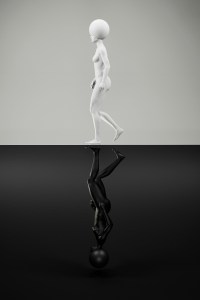The Stories Our Bodies Tell Us
- Barbara Mosher

- Aug 9, 2025
- 2 min read
Updated: Sep 9, 2025

Have you ever noticed how someone walks, or enters into a room and you can feel their current mood, or know something is off?
You are really on to something.
I recently had an unsettling personal situation that was highly stressful. This continued for a few months. I should have expected it would show up in my physical body, when out of nowhere, bam! The pain grabbed me, as if to scream, stop and listen to me. At the time I attributed it to a sports injury, not connecting the emotional component.
But our bodies are excellent historians. They record everything—joy, grief, tension, fear—and they tell those stories whether we’re aware of it or not. Posture is one of the clearest storytellers. The set of your shoulders, the lift (or droop) of your chin, even how your feet meet the floor… all of it is a kind of silent language.
When we carry unprocessed experiences—trauma, chronic stress, even long-term worry—it can bend us, tighten us, and change the way we hold ourselves. That “sports injury” I thought I had was actually my body’s way of broadcasting what my mind didn’t want to admit.
Then, in one of those uncanny moments of synchronicity, I stumbled on a podcast—while out on a recovery walk—on this very subject. The guest spoke about posture as both a physical and emotional art form. How our stance can become a cage, or a canvas. That struck me. Posture isn’t just mechanical; it’s expressive. It can reveal where we’ve been, what we’re holding, and—if we work with it—where we’re going.
Since then, I’ve been paying attention. To how I sit at my desk, how I stand in line at the store, even how I breathe when I’m painting. I’ve noticed that small, conscious adjustments—rolling my shoulders back, letting my jaw soften, rooting my feet—change more than just my appearance. They shift my mood, my focus, my sense of presence.
Posture may be the most honest thing about us. And when we start treating it as a living art form—one that tells our truth but also shapes it—we open the door to deeper self-awareness and healing.
Your body is always speaking—sometimes in whispers, sometimes in shouts. The next time you catch yourself hunched over your phone, holding your breath, or standing with your arms crossed, pause. Ask yourself: What am I really carrying right now? Then see what happens if you let your shoulders drop, your spine lengthens, your heart open. Posture is both a reflection of your inner life and a tool to reshape it. Use it with intention.
If you’re curious about the deeper connection between posture, emotion, and energy, the podcast that landed in my lap might open something for you too: Listen at Gaia, Your Body is Talking to You
If this resonated with you, share it with a friend who might need the reminder that posture tells a story.
Comment below with one word that describes your posture today,
Follow Barbara Mosher
Listen to “Art in Living” Podcast
Comments